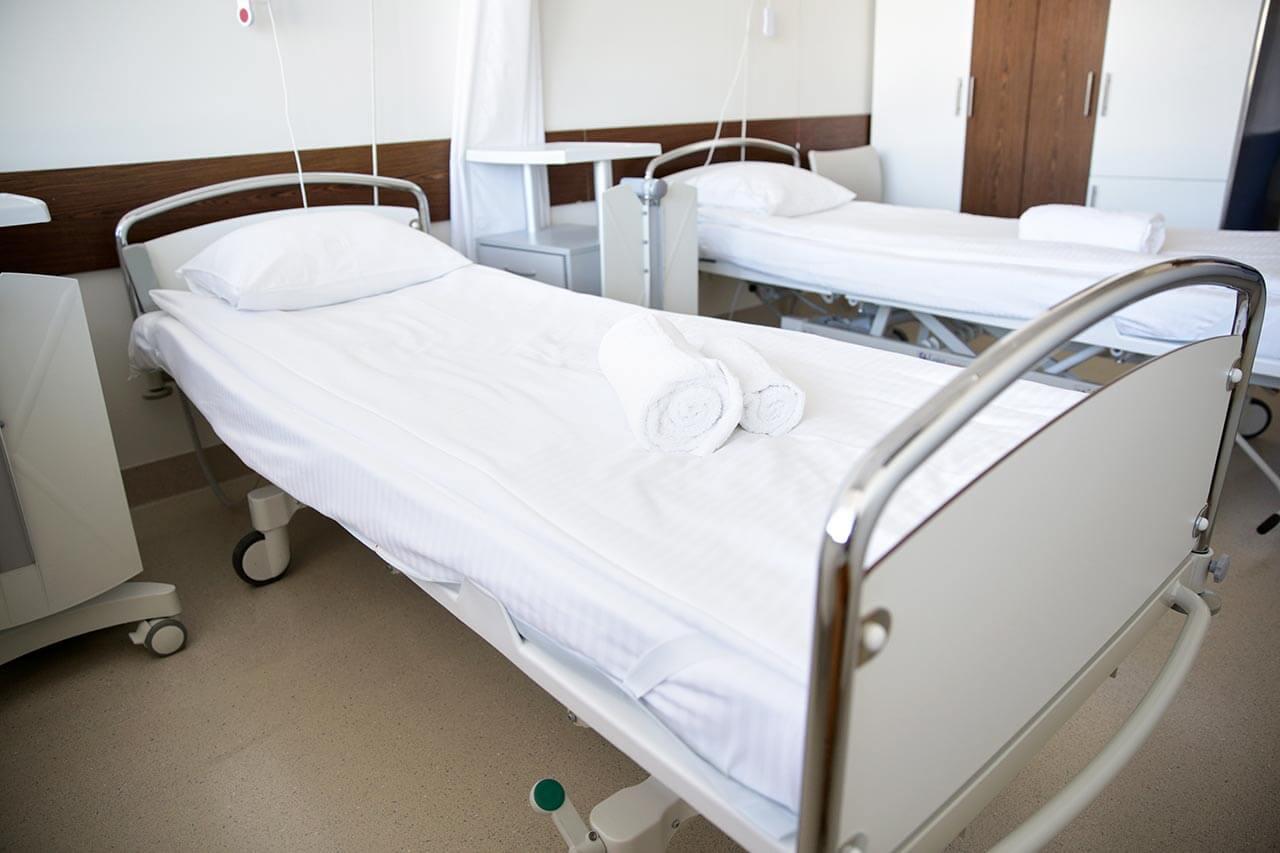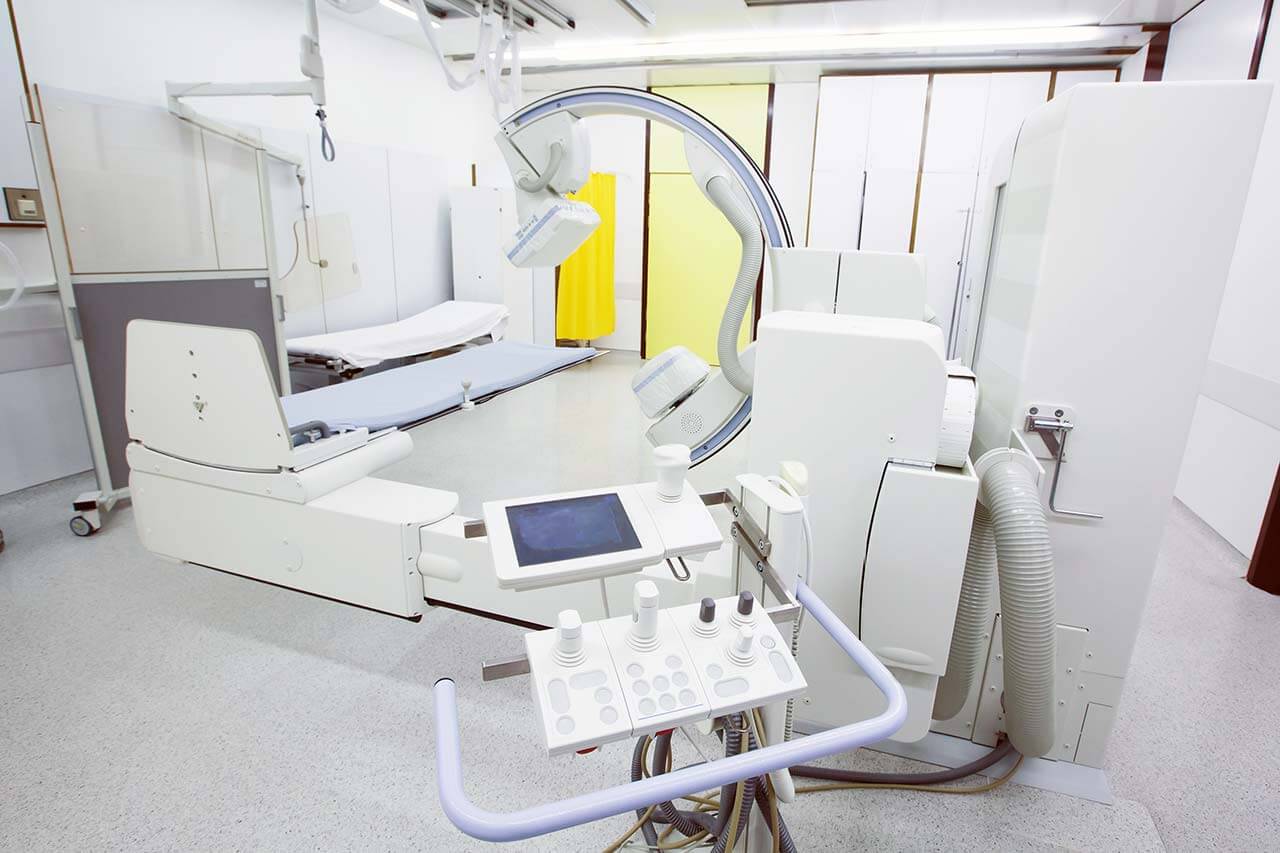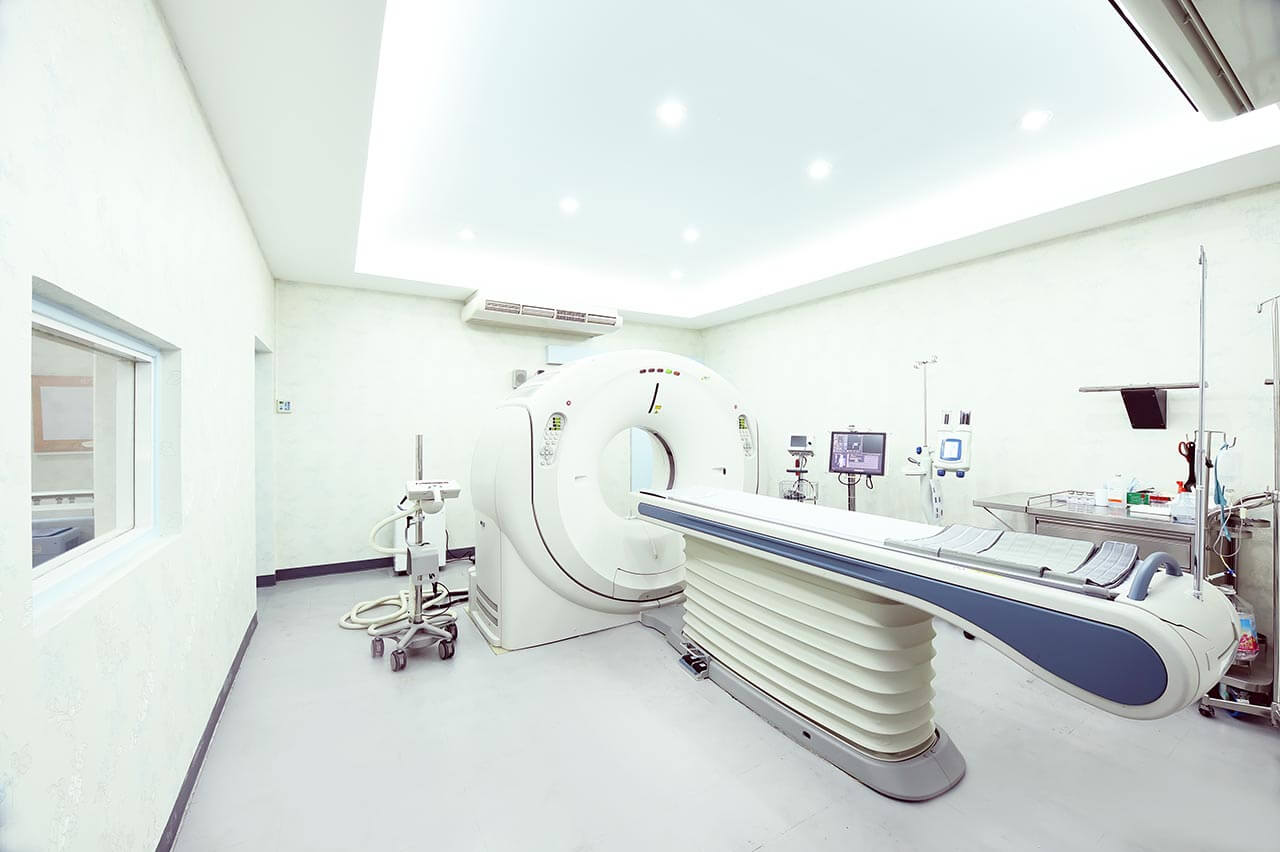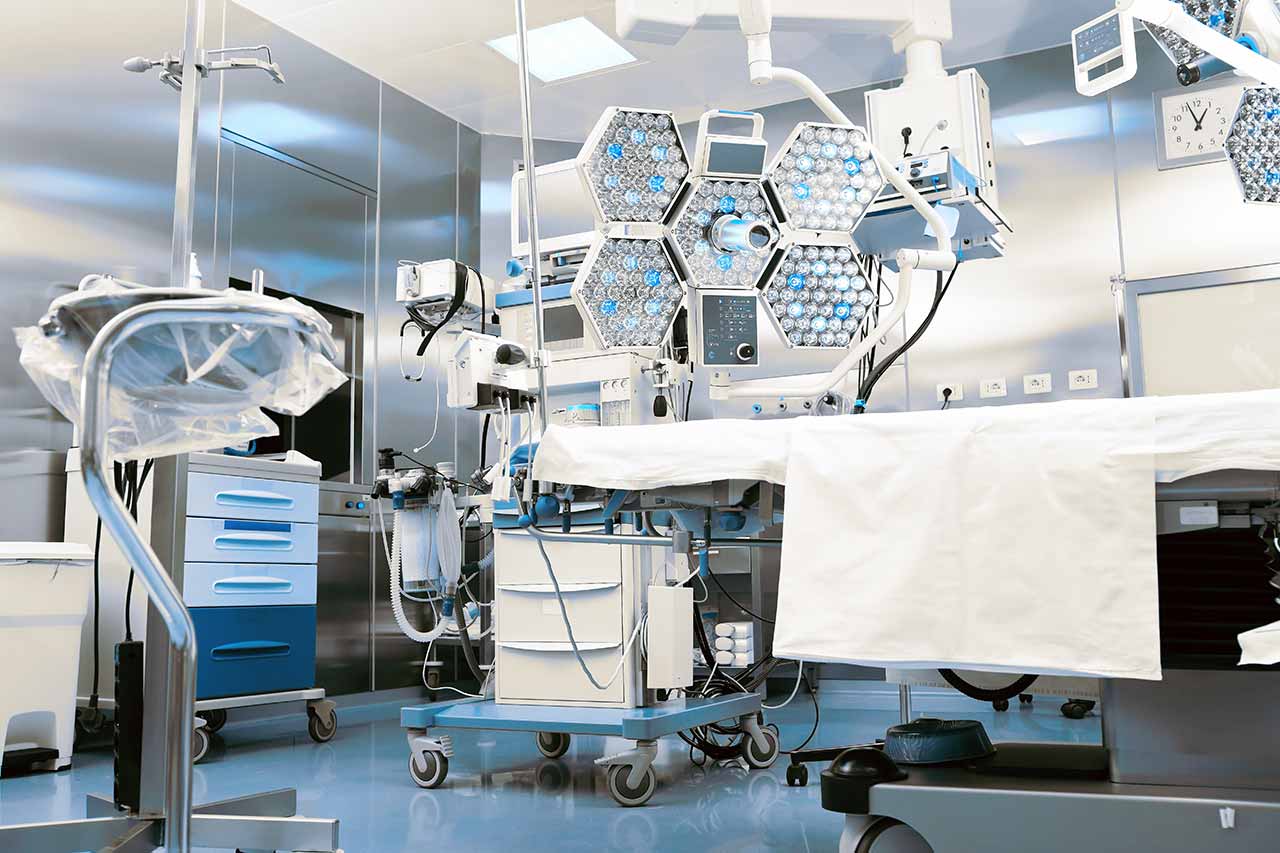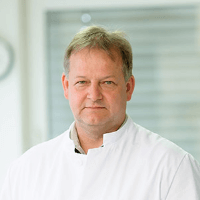
The program includes:
- Initial presentation in the clinic
- clinical history taking
- physical examination
- laboratory tests:
- complete blood count
- general urine analysis
- biochemical analysis of blood
- TSH-basal, fT3, fT4
- tumor markers
- indicators of inflammation
- indicators blood coagulation
- CT / MRI / Ultrasaund of head and neck
- hormonal therapy
- symptomatic treatment
- control examinations
- cost of essential medicines and materials
- nursing services
- nursing services
- services of all leading experts
- explanation of individual treatment plan
Required documents
- Medical records
- MRI/CT scan (if available)
Service
You may also book:
 BookingHealth Price from:
BookingHealth Price from:
About the department
The Department of Pediatric Oncology, Hematology, Pulmonology, Cardiology and Rheumatology at the University Hospital Essen offers the full range of medical services in these fields. The department specializes in the diagnostics and treatment of diseases of the hematopoietic system, various types of cancer, pathologies of the lungs, cardiovascular system and rheumatic diseases. An experienced medical team of the department, consisting of 18 doctors and 56 nurses, provides an optimal treatment and quality care for young patients of different age categories. The department treats about 1,300 inpatients and more than 12,300 outpatients every year. The Chief Physician of the department is Prof. Dr. med. Dirk Reinhardt.
In the field of hematology, young patients receive the treatment of all benign and malignant blood diseases. The focus is on the treatment of leukemia, thalassemia, anemia, immunodeficiency disorders, blood clotting disorders, etc.
The pediatric oncologists of the department deal with the treatment of various malignant diseases in children and adolescents. A special focus is on brain tumors, solid tumors, leukemias and lymphomas. The course of oncopathology in children differs significantly from the pathological process in adults, and therefore the treatment is provided by specially trained pediatricians. All the diagnostic and therapeutic measures comply with national protocols developed by the experts of the German Society of Pediatric Oncology and Hematology, which are regularly updated and adapted to current scientific advances. Thus, the treatment process is optimized, which guarantees the most positive treatment outcome. The department is certified by the German Cancer Society. In addition to the main treatment methods, for example, chemotherapy, stem cell transplantation, the children and their parents are offered psychosocial support, palliative care, etc.
Another key focus of the department is pediatric pulmonology. The doctors have excellent qualifications in the treatment of all diseases of the upper respiratory tract, lungs, respiratory muscles and thorax in children and adolescents. The department operates the Center for Cystic Fibrosis, Rare Lung Diseases and Chronic Respiratory failure (integrated into the Center for Rare Diseases). The young patients are offered a wide range of diagnostic examinations, such as pulmonary function testing using spirometry, whole body plethysmography, methacholine challenge test, spiroergometry, bronchoscopy, sleep screening (within the framework of the specialized laboratory), sweat test, allergic tests, flexible digital endoscopy and many other diagnostic methods.
In the field of pediatric cardiology, the department provides the treatment of congenital and acquired diseases of the heart and blood vessels in patients under the age of 18 years. Due to the availability of the advanced medical equipment and high competence of doctors, many heart pathologies are diagnosed and treated in the womb. To make an accurate diagnosis, there are used various studies, such as echocardiography, color-coded vascular ultrasound, transesophageal echocardiography, including 3D scanning, electrocardiogram, 24-hour blood pressure monitoring, ergometry, spiroergometry, etc. The pediatric cardiologists are also competent in the interventional diagnostics and therapy of heart pathologies in children. The department also specializes in the treatment of heart arrhythmias (implantation of pacemakers and defibrillators).
The department’s service spectrum is complemented by the diagnostics and treatment of rheumatic diseases in children and adolescents (in particular, juvenile idiopathic arthritis). Rheumatic diseases are difficult to diagnose, while their detection requires an immediate, comprehensive treatment. The treatment process involves ophthalmologists, pediatric orthopedists, physiotherapists, occupational therapists, psychologists and other specialists. In most cases, therapy is outpatient, but depending on the situation and the severity of the disease, inpatient care may be required. The treatment of children with rheumatic diseases is carried out in strict accordance with the recommendations of the German Society for Pediatric and Adolescent Rheumatology and the North Rhine-Westphalian League Against Rheumatology.
The department’s service range includes:
- Pediatric hematology and oncology
- Benign blood diseases
- Hemorrhagic disorders (for example, myelodysplastic syndrome, severe aplastic anemia)
- Congenital anemias (for example, thalassemia, sickle cell anemia, Diamond-Blackfan anemia or spherocytosis)
- Acquired anemias (for example, iron deficiency anemia)
- Immunologically related cytopenias (thrombopenia, neutropenia, anemia)
- Congenital neutropenia and congenital amegakaryocytic thrombocytopenia
- Immunodeficiency disorders
- Coagulation disorders with a tendency to bleeding, such as hemophilia or von Willebrand disease
- Coagulation disorders with thromboembolic complications, thrombosis and stroke
- Malignant diseases of the hematopoietic and nervous systems
- Leukemias
- Lymphomas
- Brain tumors
- Solid tumors
- Diagnostic and therapeutic options
- Bone marrow puncture
- Lumbar puncture
- Radiological diagnostics
- Chemotherapy
- Radiation therapy
- Maintenance therapy (for example, blood transfusion, antibiotics)
- Alternative forms of therapy (for example, mistletoe therapy)
- Psychosocial support
- Benign blood diseases
- Pediatric pulmonology
- Malformations of the respiratory tract and lungs
- Malformations of the pulmonary vascular system
- Bronchopulmonary dysplasia
- Interstitial lung diseases
- Primary ciliary dyskinesia
- Alpha-1-antitrypsin deficiency
- Exogenous allergic alveolitis
- Bronchial asthma
- Chronic obstructive pulmonary disease
- Chronic respiratory infections
- Tuberculosis
- Systemic diseases due to the lesions of the airways and/or lungs
- Sleep-related breathing disorders
- Cystic fibrosis
- Rare diseases of the respiratory tract and lungs
- Pediatric cardiology
- Echocardiography (heart ultrasound), including 3D imaging using color Doppler
- Color Doppler of the heart vessels
- Transesophageal echocardiography, including 3D imaging with color Doppler
- Electrocardiogram
- Long-term ECG recording
- 24-hour blood pressure monitoring
- Ergometry/spiroergometry (stress studies of the heart)
- Pulse oximetry (oxygen saturation measurement)
- Tilt test for syncope diagnostics
- Cardiopulmonary studies, including computed tomography
- Magnetic resonance imaging (MRI) of the heart and blood vessels
- Interventional diagnostics and therapy (catheter techniques)
- Diagnostic tests
- Dilatation in heart valve stenosis
- Stent implantation in vascular stenosis
- Heart valve implantation o
- Closure of heart defects (holes)
- Care for adults with congenital heart diseases
- Pediatric rheumatology
- Juvenile idiopathic arthritis
- Drug therapy, including modern biological drugs
- Juvenile idiopathic arthritis
- Other diseases, other diagnostic and therapeutic options
Curriculum vitae
Professional Career
- 1987 - 1993 Study of Sports Sciences, University of Göttingen.
- 1987 - 1993 Study of Human Medicine, University of Göttingen.
- 12.1993 Doctoral thesis defense in Pediatrics.
- 01.1994 - 1999 Junior Research Assistant in the Department of Pediatrics at the University of Göttingen.
- 11.1999 Research Assistant in the Department of Pediatrics at the University of Muenster.
- 2000 St. Jude Children Research Hospital (Prof. Dario Campana), Memphis.
- 08.2000 Board certification in Pediatrics.
- 01.2005 Habilitation at the University of Muenster.
- 04.2005 Pediatric Hematology and Oncology / Stem Cell Transplantation.
- 05.2005 Senior Physician in the Department of Pediatric Hematology / Oncology at the Hannover Medical School (Director: Prof. Dr. med. K. Welte).
- 11.2005 Specialization in Pediatric Hematology and Oncology; Member of the Medical Commission of the Medical Association of Lower Saxony.
- 03.2007 Invitation to W2 Professorship for Pediatric Hematology and Oncology at the University of Leipzig (rejection).
- 10.2007 Extraordinary Professor of the Hannover Medical School.
- Since 03.2010 Chair of the I-BFM AML Study Committee.
- Since 06.2009 Head of the AML-BFM Study Group.
- 03.2011 - 03.2012 Head of the Department of Pediatric Hematology and Oncology, Hannover Medical School.
- 03.2012 Additional qualification in Laboratory Diagnostics in Pediatric and Adolescent Medicine, Medical Association of Lower Saxony.
- 03.2012 Chair of the I-BFM AML Study Committee, 2nd term.
- 09.2012 2nd Acting Chairman of the Society of Pediatric Oncology and Hematology (GPOH).
- 08.2013 Managing Director (honorary) of the Society of Pediatric Hematology and Oncology (GPOH).
- 09.2014 Head of the Department of Pediatric Oncology, Hematology, Pulmonology, Cardiology and Rheumatology at the University Hospital Essen; W3 Professorship at the University of Duisburg-Essen.
Membership in Societies and Functions
- Since 09.2007 1st Chairman of the "Network for the care of seriously ill children and adolescents".
- 12.2008 Speaker of the Working Group on Pediatric Palliative Care of Lower Saxony.
- 06.2009 Managing Director "Care network for critically ill children".
- Since 2011 Member of the Clinical Trial Committee of the ITCC.
- Since 2013 2nd Deputy Chairman of the Society of Pediatric Hematology and Oncology (GPOH).
- Since 2013 Managing Director (honorary) of the Society of Pediatric Hematology and Oncology (GPOH).
- 09.2014 Specialized Ambulatory Pediatric Palliative Care (SAPPV) in Lower Saxony.
Prizes and Awards
- 2006 Poster Prize of the North German Society for Pediatrics.
- 08.2006 Travel Award of the American Society of Hematology.
- 2010 Prize of the Quality Initiative of Lower Saxony.
- 2012 Cancer Award of the NIO (Lower Saxony Oncologists).
- 2014 Study Award of the German Cancer Aid.
- 2014 German Childhood Cancer Aftercare Award.
Photo of the doctor: (c) Universitätsklinikum Essen
About hospital
According to the authoritative Focus magazine the University Hospital Essen ranks among the top German hospitals!
With 27 specialized departments and 24 institutes, the hospital in Germany is a maximum care medical facility. The hospital has 1,300 beds for inpatient treatment. A highly qualified medical team of more than 6,000 employees takes care of the health of patients. All the specialists give preference to an interdisciplinary medical care, which guarantees a comprehensive treatment taking into account the smallest aspects of a particular pathology. The hospital annually diagnoses and treats more than 50,000 inpatients and about 195,000 outpatients, which testifies to the prestige of the medical institution and the highest quality of treatment in Germany.
The hospital presents all the modern medical fields. Nevertheless, special attention should be given to the following major fields of specialization as oncology, transplantology and cardiology, as well as research activities in the field of immunology, infectology and translational examinations of pathologies of the nervous system and behavioral disorders.
Established on the basis of the standard American model of Comprehensive Cancer Centers, the West German Cancer Center (WTZ) in Essen was recognized as the best medical facility of this kind in Germany in 2009. Nowadays, the center holds leading positions both on the national and international medical markets. The basis of its successful clinical practice is the use of very latest treatment methods and an interdisciplinary approach to each clinical case. The West German Organ Transplant Centre (WZO) is also recognized as one of the best in the country and one of the few in Germany, which specializes in the transplantation of all vital organs, such as kidney, liver, pancreas, heart and lungs. Special attention is paid to kidney and liver transplantation.
The hospital in Germany is proud of its high-tech medical equipment, experienced and competent staff, productive research activities, which allow to guarantee the accurate diagnostics and effective treatment, including rare and very complex clinical cases for every patient. Consequently, the hospital is considered a perfect embodiment of high-quality treatment in Germany.
Photo: (c) depositphotos
Accommodation in hospital
Patients rooms
The patients of the University Hospital Essen live in comfortable rooms designed in bright colors. The standard room furnishing includes an automatically adjustable bed, a bedside table, a personal wardrobe, a personal call button with a built-in light panel, a telephone, a TV and a radio. The Internet access is available at an additional cost.
Meals and Menus
The patients of the hospital are offered a daily choice of three menus. The patients are also offered alternative types of menus, if their religion requires the exclusion of certain foods. If you follow a certain diet or suffer from food intolerance, you will be provided with a menu of your choice by discussing it with your attending physician in advance. The hospital also houses a bistro and a cafe, where one can have a tasty snack, enjoy hot and cold drinks.
Further details
Standard rooms include:
Accompanying person
There are a few types of hotels for the accompanying persons, who want to stay near the hospital. The hotel of the Essen University Hospital offers apartments on the first floor of the nursing high-rise building. The DRK nursing also offers single and double rooms.
The hotel in Grugapark is available for the parents, whose children stay in the hospital. The parents of children with cancer can also stay here. Moreover, The Department of Pediatrics offers its rooms for parents.
